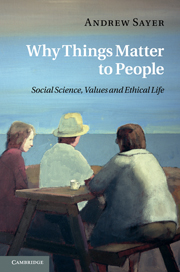Book contents
- Frontmatter
- Contents
- Acknowledgements
- 1 Introduction: a relation to the world of concern
- 2 Values within reason
- 3 Reason beyond rationality: values and practical reason
- 4 Beings for whom things matter
- 5 Understanding the ethical dimension of life
- 6 Dignity
- 7 Critical social science and its rationales
- 8 Implications for social science
- Appendix: Comments on philosophical theories of ethics
- References
- Index
8 - Implications for social science
Published online by Cambridge University Press: 05 June 2012
- Frontmatter
- Contents
- Acknowledgements
- 1 Introduction: a relation to the world of concern
- 2 Values within reason
- 3 Reason beyond rationality: values and practical reason
- 4 Beings for whom things matter
- 5 Understanding the ethical dimension of life
- 6 Dignity
- 7 Critical social science and its rationales
- 8 Implications for social science
- Appendix: Comments on philosophical theories of ethics
- References
- Index
Summary
We feel that even when all possible scientific questions have been answered, the problems of life remain completely untouched.
(Wittgenstein, 1922, Tractatus Logico-Philosophicus, 6.52)First it was nature that was ‘neutralized’ with respect to value, then man himself. Now we shiver in the nakedness of nihilism in which near-omnipotence is paired with near emptiness, greatest capacity with knowing least for what ends to use it.
(Jonas, 1984, p. 23)By way of conclusion I would like to draw out some implications of the preceding chapters for how we do social science.
(1) Social science – at least apart from philosophy and political theory – needs to overcome its peculiar combination of aversion and indifference towards normativity. Normativity, resulting from neediness, ill-being and desire, and the capacity for reason, understood in the broad sense I have defended, is intrinsic to human being. As we saw in Chapter 4, the very concept of human being is partly normative: its object is always more or less deficient and capable of development or decline.
(2) It is important to complete the deconstruction of the fact–value family of dualisms, not in order to deny any kind of differences among things like fact and value, reason and emotion, or nature and culture, but to acknowledge their internal differences, interactions and overlaps. […]
- Type
- Chapter
- Information
- Why Things Matter to PeopleSocial Science, Values and Ethical Life, pp. 246 - 252Publisher: Cambridge University PressPrint publication year: 2011



